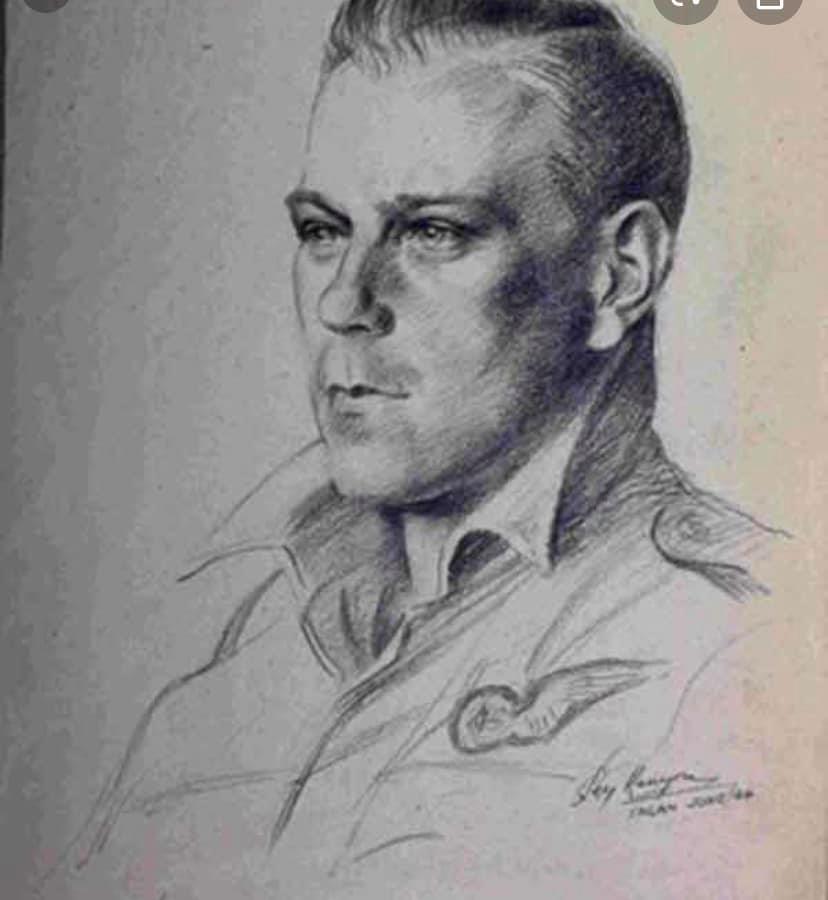Nicholas Alkemade – the man who fell to earth
10 July 2020
This is the story of a remarkable man.
Nicholas Alkemade – ‘Nick’ to his friends and family – is most famous for his fall to earth without a parachute. This was only the start of a series of incredible events, any one of which would have finished a lesser man.
To start at the beginning, Nicholas was born on 10 December 1922 in North Walsham, Norfolk and became a market gardener in Loughborough before the outbreak of war.
He trained as an Air Gunner and was posted to 115 Squadron as a rear gunner on their Avro Lancasters. After successfully completing 14 operations, Alkemade’s crew were detailed to raid Berlin [the event to which the title refers] on the night of 24/25 March 1945.
The aircraft, christened Werewolf by its crew, took off from RAF Witchford, Cambridgeshire at 18:48 and set course for Berlin.
The Lancaster was hit by enemy fire, engulfed in flames and lost control. The crew started to parachute out, but when Alkemade went to get his own ‘chute’ it caught fire and became unusable [as a rear gunner there was no room for him to wear a chute while in the turret], so in a matter of seconds he had to face a terrible choice: perish by getting burnt or make it faster by jumping, as they were at 18,000 feet of altitude. He chose to jump.
He later recalled:
“I had no doubts at all that this was the end of the line. The question was whether to stay in the plane and fry or jump to my death. I decided to jump and make a quick, clean end of things. I backed out of the turret and somersaulted away.”
But Alkemade survived the fall. Possibly blacking out, he fell through the branches of a pine tree into a snowbank. He was picked up by the Germans who initially thought he was a spy. Nicholas was captured and taken to one of the Second World War’s most notorious prisoner of war camps – Stalag Luft III. Here was a secure enclosure operated by the Germans which housed captured Allied airmen. His first experience of the encampment was to be placed in the room where, a week previously, the Great Escape brigade had tunnelled their way out.
Alkemade and the other inmates of Stalag Luft III would later be among the tens of thousands of Allied Prisoners of War forced to march westward – now known as the Long March – some pulling possessions on hastily-crafted sledges, through blizzard conditions and on little food, so the Germans could prevent their liberation by the advancing Russians.
Sergeant A G Nicholas Alkamade, RAF, Prisoner of War Number: 4175, was repatriated at the end of the war and returned to Pearl, who was to become his wife.
All this is quite remarkable but what follows defies explanation of how one man can survive everything that was thrown at him.
Alkemade returned to Loughborough, finding work in a chemical plant. Not long after starting his new job, he again cheated death. While removing chlorine gas-generating liquid from a sump, he received a severe electric shock from the equipment he was using. Reeling away, his gas mask became dislodged and he began breathing in the poisonous gas. An agonising 15 minutes were to pass before his appeals for aid were answered and he was dragged to safety, nearly asphyxiated by the fumes.
Dodging the bullet once again, not long after, a siphoning pipe burst spraying Alkemade’s face and arms with industrial sulphuric acid. He dived head-first into a nearby 40-gallon drum of lime wash to neutralise the acid. Alkemade had first degree burns but had survived again. Sometime later Alkemade was pinned beneath a nine-foot-long steel door runner that fell from its mountings as he passed by, again cheating death.
Alkemade thought that enough was enough and became a furniture salesman with Clemersons Limited in Loughborough.
Nicholas had one further claim to fame – he appeared on the ITV series ‘Just Amazing!’ – a programme where former motorcycle racer Barry Sheene interviewed people who had achieved feats of daring and survival.
Alkemade died in June 1987, long after his number had been called.
Here is a film of Nicholas recalling his adventure. (Note: it has a French voice over so it’s not possible to hear his account properly.)
Here are a couple of articles – from the RAF Museum and the Leicester Mercury – which document Nicholas’ war experiences in more detail.
by Julie Harper

With thanks to his granddaughter Charlotte Cooper for permission to use this image.